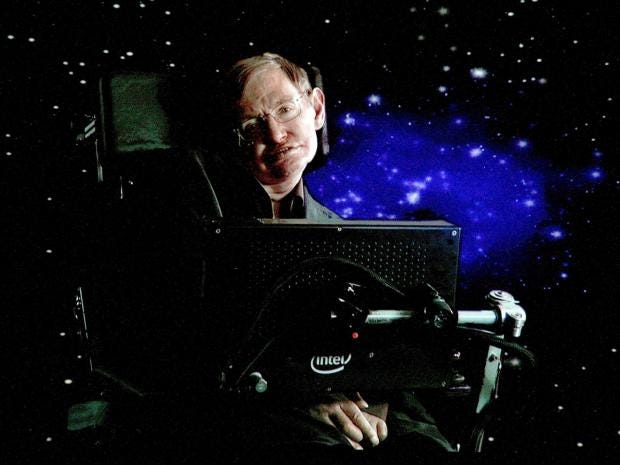With the sad news of Professor Hawking’s death, it is only natural that we take time to appreciate his many contributions to science and his commitment to communicating it in simple terms so that everyone could appreciate its importance. Hawking’s name is rarely mentioned without noting black holes and the Big Bang.
This is for good reason. Throughout his whole career, which spanned more than five decades, the scientist worked to understand extreme physical situations. To describe both black holes and the Big Bang, one needs to deal with a concept known as spacetime singularity, a point where the gravitational field of an object becomes infinite.
He worked on singularities in our universe in his thesis and with collaborator Roger Penrose. Together, they published a proof showing that based on the laws we believe govern reality, the universe must have begun in a singularity.
He then worked on trying to formalize the math that describes the properties of black holes. His most famous equation was produced through this work with Jacob Bekenstein, where they connected the entropy of a black hole to its surface area.
Out of his extensive work on black holes, people will be most familiar with the concept of Hawking radiation, the idea that a certain amount of radiation is released by black holes due to quantum effects near the event horizon. The effect in question is particle-antiparticle creation around the black hole.
When matter and antimatter touch, they annihilate and turn into energy. The opposite approach is also possible, where energy turns into particles. The energy of the vacuum itself can create fluctuations that are similar to particles (so-called virtual particles).
When these fluctuations happen near event horizons, the black hole can capture one particle of the pair and boost the other one into existence. The particle-antiparticle pairs are created by the gravitational energy of the black hole, so when one particle escapes, it lowers the energy of the black hole.
Hawking radiation can lead to the evaporation of a black hole if it has nothing to feed on. And the smaller the black hole is, the more radiation it will emit. We are yet to observe Hawking radiation directly, but its existence has become a key feature in our treatment of black holes. The late professor has also strongly influenced how we talk about the complexity of the universe.
In his books, such as A Brief History of Time and The Universe in a Nutshell, he was able to convey difficult aspects of cosmology with simplicity and precision. He and his endeavors will not be forgotten.
Via IFLScience


